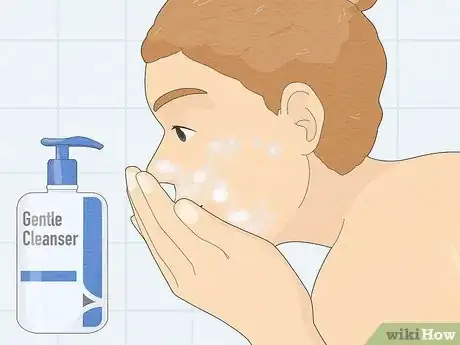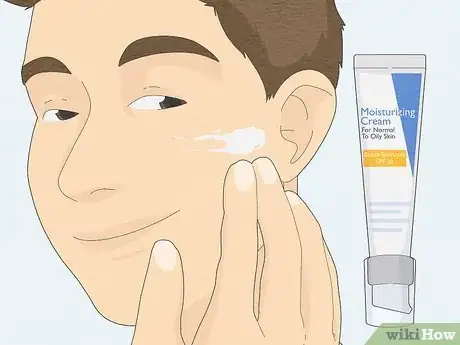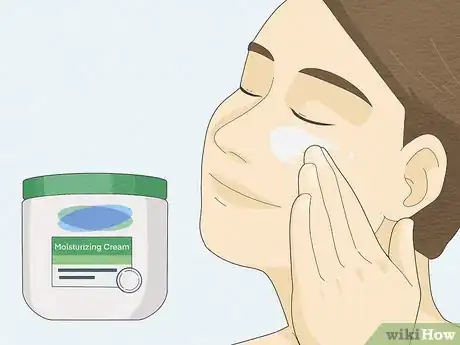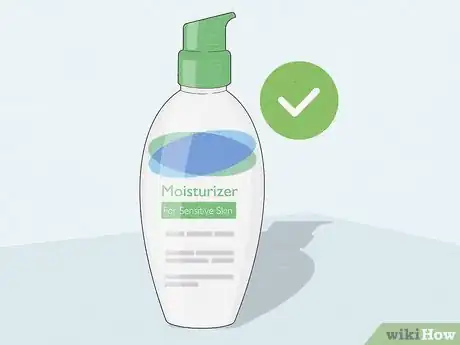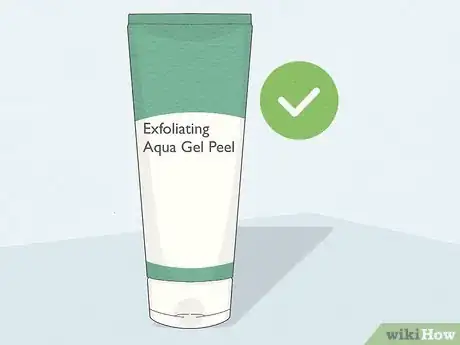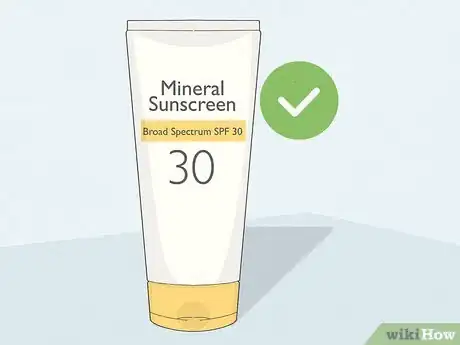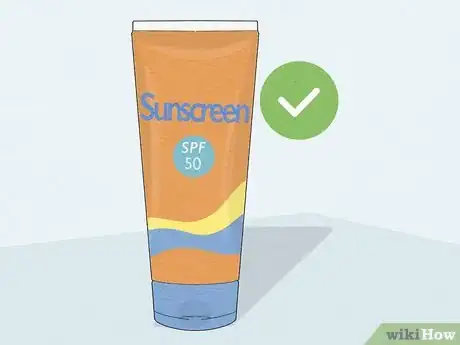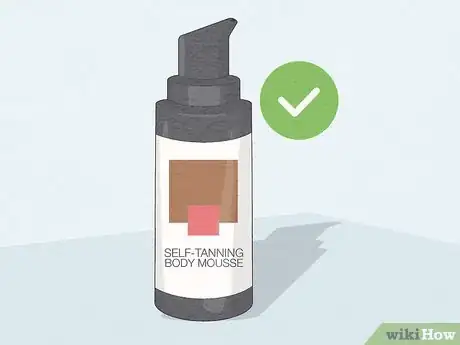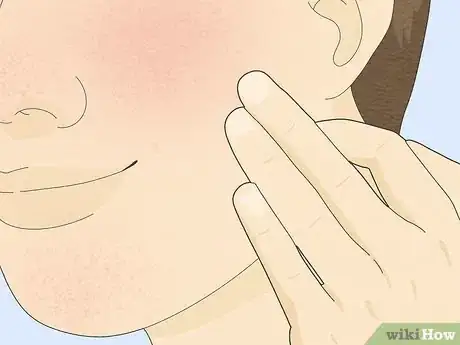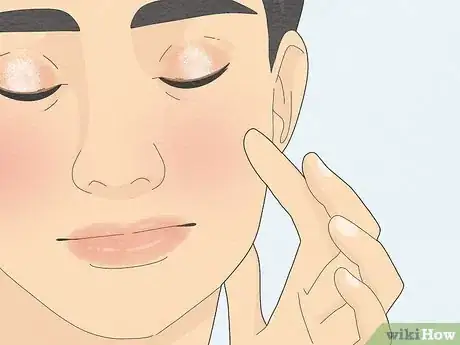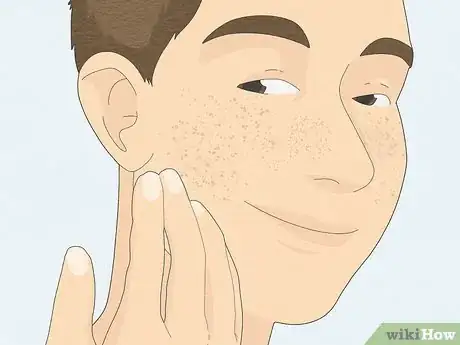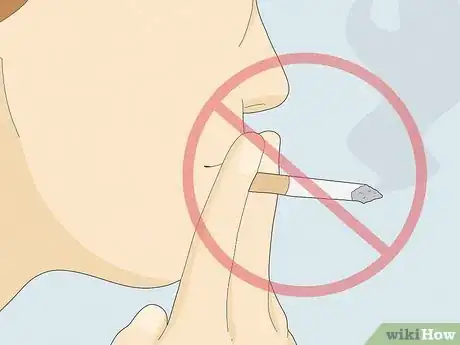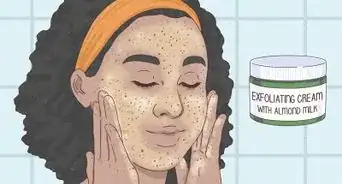This article was medically reviewed by Mohiba Tareen, MD. Mohiba Tareen is a board certified Dermatologist and the founder of Tareen Dermatology located in Roseville, Maplewood and Faribault, Minnesota. Dr. Tareen completed medical school at the University of Michigan in Ann Arbor, where she was inducted into the prestigious Alpha Omega Alpha honor society. While a dermatology resident at Columbia University in New York City, she won the Conrad Stritzler award of the New York Dermatologic Society and was published in The New England Journal of Medicine. Dr. Tareen then completed a procedural fellowship which focused on dermatologic surgery, laser, and cosmetic dermatology.
There are 20 references cited in this article, which can be found at the bottom of the page.
This article has been viewed 37,898 times.
Pale, or fair, skin is incredibly beautiful if properly cared for. Fair skin usually means that it is also sensitive to irritation from environmental factors or harsh products. Lighter skin is more easily damaged by sun and requires extra protection outdoors. Ensuring that your fair skin stays healthy is easy as long as you follow some basic steps.
Steps
Developing a Regular Skin Care Regimen
-
1Wash your face daily with a mild cleanser. If you have extra sensitive skin, or any time your skin becomes irritated, wash it only once a day with a basic cleanser. Use gentle makeup remover wipes or micellar water to wipe off makeup and dirt for your second cleansing routine.[1]
- Use cleanser in the morning or night, whichever works best for your schedule and skin.
- Micellar water, used by French women for years, is enriched with micelles, molecules that literally eat up dirt and oil, and is extremely gentle.[2]
-
2Use a lightweight moisturizer with at least SPF 30 every morning. [3] Wearing sunscreen every day is important since it protects your skin from sun damage.[4] Choose a sunscreen that also contains antioxidants for the best protection against sun damage.[5]
- "Fixing" sun-damaged skin with after-sun products containing antioxidants is not nearly as effective as applying antioxidants along with sunscreen.
- Almost all moisturizers today contain some level of SPF protection. If your favorite brand only has SPF 15, though, you also need to apply a sunscreen with SPF 30 either before moisturizer or after makeup.[6]
- Make your own moisturizer with a cucumber and honey. Cucumber juice is excellent for your skin. Mash a cucumber, mix with honey, and apply directly to skin.[7] Remember this doesn't offer any sun protection, so you should apply an SPF lotion as well.
Advertisement -
3Use a heavier moisturizing cream at night. A thick moisturizer will help replace antioxidants lost throughout the day while you sleep. Look for one made for your skin type, whether oily, dry or a combination of the two.[8]
- You don’t have to spend big bucks to get a good face cream. Neutrogena and Cetaphil work just as well as pricier designer brands.
- Avoid anti-aging night creams and other products that claim to defy aging. They are usually too harsh for fair, sensitive skin and are unnecessary if you take care of your skin in the first place.[9]
- Look for a moisturizer with ceramide as a base. Ceramide holds onto water and helps moisture stay deeper in your skin barrier.[10]
-
4Choose products made for sensitive skin and try them one at a time. All fair skin is not equal, and a product that works great for your friend or sister may react differently with your skin.[11] If products for regular skin are causing redness or irritation, switch to using only sensitive skin formulas. Trying out new products one at a time ensures you will know the cause of any irritation that occurs.
- If any products you use cause redness, blotchiness, or puffing, discontinue immediately.
- Many retailers will allow you to return or exchange products even if they are open, so you don't waste money trying to find a great one for your skin. Check store policies before purchasing anything pricey.
- Look online for product reviews before you buy. Do an online search by product name and check out makeup and skincare blogs, and/or fashion magazine websites.
-
5Use only gentle exfoliants. Sensitive skin can't take harsh treatments at all, and fair skin is more likely to become sensitive if you use these products often. Try using exfoliating products without granules or gritty additives — try face peels or exfoliating gels instead. These contain ingredients that draw dirt and oil out of your skin without having to scrub.[12]
- Make your own exfoliating mask with strawberries or papaya mixed with yogurt, water or oil. Fruits contain antioxidants that eat up dirt and dead cells. Don't leave this mixture on your face for longer than 10 minutes, though.[13]
- You can also mix organic sugar with honey, or use oatmeal instead of sugar for a gentler mask. Rub on face gently in small circles and rinse off with warm water.[14]
- Always avoid products with very rough ingredients like nut shells or seed pods. These sharp fragments are too harsh for any skin type.
- Over-exfoliating can make your skin red and irritated.[15]
Protecting Fair Skin from Sun Damage
-
1Wear a broad-spectrum sunscreen with at least SPF 30 every day. Pale skin has less melanin, the component that prevents skin from being burnt by the sun's rays, and is therefore highly susceptible to sun damage and skin cancer. If your moisturizer does not have any SPF protection, or has less than SPF 30, get a lightweight sunscreen to apply every morning, even during winter and on cloudy days. Make sure the product states that it protects against both UVA and UVB rays.[16]
- Clouds don't provide protection from the sun. About 80% of the sun's rays can penetrate cloud cover.[17]
- Always wear sun protection, no matter what your plans for the day may be. Unprotected skin can burn in just a matter of minutes.
-
2
-
3Wear a wide-brimmed hat and wrap-around sunglasses. In addition to your sunscreen, wearing a hat with a wide brim can keep your face and neck from absorbing too many UV rays.[22] Wrap style sunglasses protect your eyes from damage and the skin around them from wrinkling due to squinting. If you are at the beach, fishing, watching an outside sports game in the sun, etc., you should always wear a hat and sunglasses.[23]
- Baseball caps do not protect your neck.
- Fair skinned people especially need to wear sunscreen in addition to (not instead of) a hat and glasses.
-
4Don’t avoid the sun completely. Your body needs some sun exposure to make vitamin D. Spend about 20 minutes in the sun two to three times a week in summer. Wear short sleeves and let your face get some exposure.
- Sunscreen blocks UVB rays, which are necessary to synthesize vitamin D; however, most people do not use enough sunscreen to completely block UVB rays. You should still wear sunscreen when you are outside, even when you're stepping out to make some vitamin D.[24]
- Fair-skinned people might be unable to get enough sun exposure for the body to create sufficient vitamin D without burning. Taking supplements and eating more foods like fish and eggs can bridge the gap.
-
5Avoid tanning and use self-tanners instead. Tans are literally evidence of skin damage and are not healthy for anyone.[25] Tanning beds are just as dangerous as sun exposure, if not more so. Instead, use self-tanners or bronzers to achieve a tanned look.
- Just one trip to a tanning bed before age 35 may increase your risk of melanoma by 59%, and the risk increases with each use.[26]
- Bronzers are like makeup since they can be washed off. Self-tanners give skin the appearance of a tan without the UV damage.
- Fair skin is extremely susceptible to sun damage since it doesn’t contain enough melanin to turn cells dark easily. Therefore, you are more likely to burn than tan anyway.[27]
- Tanning also causes premature aging through wrinkles and sunspots.
Addressing Other Concerns
-
1Find a good dermatologist and start seeing them regularly. They can help you deal with specific skin issues like acne and blotchiness, and also monitor your skin for signs of cancer.[28]
- Avoid ones that try to sell you their own skincare products or one brand they “recommend.” Most dermatologists learn about skin care from cosmetics companies, not from school.
- People with fairer skin often have a genetic predisposition to developing moles, regardless of how well they protect their skin from the sun. Sun exposure will create more or bigger moles, but in addition to wearing sunscreen every day, see a dermatologist to help keep track of any you already have.
-
2Choose makeup that enhances your pale skin. Picking out colors and shades of makeup for pale skin is easy if you follow a few general rules. Only accentuate one feature at a time: either your eyes or your lips; not both! Beware of dark or very brightly colored eye shadows since they may overshadow your gorgeous skin or wash you out. Always make sure your foundation, if you wear one, matches your skin.[29]
- Stick with metallic or shimmery shades for eye shadow: bronze or earth tones if your skin has warm undertones, and gold, silvery, or jewel shades for cool undertones. Determining your skin tone is easy.
- Wear brown eyeliner instead of black. It may be too drastic for light skin.
- Wear pink or rose colored blush, and be careful if adding bronzer not to overdo it. These should accentuate your natural face, not look like you added makeup.
- If your eyes are very neutral, consider a bright red lipstick (bluish red for cool undertones, orange-red for warm undertones). If you are accentuating your eyes, stick with a more neutral tone like pink, peach or rose.
-
3Accept your freckles. Many people with pale skin also have lots of freckles, whether born with them or gaining them yearly from sun exposure. The only way to really get rid of freckles is laser treatments, which can be expensive. Instead of trying to work around your freckles, work with them by choosing makeup that accentuates them.[30]
- Never leave the house without sunscreen to prevent getting more freckles, even if you have had them removed previously.
- Avoid thick foundation and use tinted moisturizer instead.
- Stick with peachy or coral blush to accentuate your freckles.
-
4
Expert Q&A
-
QuestionWhat can I use to make my sunspots fade?
 Mohiba Tareen, MDMohiba Tareen is a board certified Dermatologist and the founder of Tareen Dermatology located in Roseville, Maplewood and Faribault, Minnesota. Dr. Tareen completed medical school at the University of Michigan in Ann Arbor, where she was inducted into the prestigious Alpha Omega Alpha honor society. While a dermatology resident at Columbia University in New York City, she won the Conrad Stritzler award of the New York Dermatologic Society and was published in The New England Journal of Medicine. Dr. Tareen then completed a procedural fellowship which focused on dermatologic surgery, laser, and cosmetic dermatology.
Mohiba Tareen, MDMohiba Tareen is a board certified Dermatologist and the founder of Tareen Dermatology located in Roseville, Maplewood and Faribault, Minnesota. Dr. Tareen completed medical school at the University of Michigan in Ann Arbor, where she was inducted into the prestigious Alpha Omega Alpha honor society. While a dermatology resident at Columbia University in New York City, she won the Conrad Stritzler award of the New York Dermatologic Society and was published in The New England Journal of Medicine. Dr. Tareen then completed a procedural fellowship which focused on dermatologic surgery, laser, and cosmetic dermatology.
FAAD Board Certified Dermatologist Over-the-counter retinol creams can help fade sunspots since they increase cell turnover. You can also use products that contain alpha-hydroxy acid. For a faster solution, talk to a dermatologist about chemical peels or laser treatments.
Over-the-counter retinol creams can help fade sunspots since they increase cell turnover. You can also use products that contain alpha-hydroxy acid. For a faster solution, talk to a dermatologist about chemical peels or laser treatments.
References
- ↑ http://www.doctoroz.com/article/dr-oz-anti-aging-plan-your-skin-type?page=2
- ↑ http://www.today.com/style/michellar-cleansing-waters-are-rinse-less-way-wash-your-face-t11566
- ↑ http://www.doctoroz.com/article/dr-oz-anti-aging-plan-your-skin-type?page=2
- ↑ Mohiba Tareen, MD. FAAD Board Certified Dermatologist. Expert Interview. 26 March 2020.
- ↑ http://www.cosmopolitan.com/style-beauty/beauty/advice/a3487/surprising-secret-to-perfect-skin/
- ↑ http://health.howstuffworks.com/skin-care/moisturizing/basics/should-you-put-moisturizer-or-sunscreen-on-your-face-first-.htm
- ↑ https://bellatory.com/skin/Best-25-proven-ways-on-how-to-get-natural-fair-skin-by-home-remedies
- ↑ http://www.doctoroz.com/article/dr-oz-anti-aging-plan-your-skin-type?page=2
- ↑ http://www.doctoroz.com/article/dr-oz-anti-aging-plan-your-skin-type?page=2
- ↑ Mohiba Tareen, MD. FAAD Board Certified Dermatologist. Expert Interview. 26 March 2020.
- ↑ http://www.prevention.com/beauty/skin-care/facial-skin-care-help-sensitive-skin-and-skin-allergies
- ↑ http://stylecaster.com/beauty/an-exfoliation-guide-for-sensitive-skin/
- ↑ http://stylecaster.com/beauty/an-exfoliation-guide-for-sensitive-skin/
- ↑ http://naturalbeautytips.co/how-to-even-skin-tone-on-face/
- ↑ Mohiba Tareen, MD. FAAD Board Certified Dermatologist. Expert Interview. 26 March 2020.
- ↑ http://www.huffingtonpost.com/2012/05/22/what-spf-should-i-use_n_1530402.html
- ↑ http://naturalbeautytips.co/how-to-even-skin-tone-on-face/
- ↑ http://www.americanskin.org/resource/safety.php
- ↑ http://patient.info/health/preventing-skin-cancer
- ↑ http://patient.info/health/preventing-skin-cancer
- ↑ http://www.huffingtonpost.com/2012/05/22/what-spf-should-i-use_n_1530402.html
- ↑ Mohiba Tareen, MD. FAAD Board Certified Dermatologist. Expert Interview. 26 March 2020.
- ↑ http://patient.info/health/sun-and-health
- ↑ http://www.health.harvard.edu/staying-healthy/6-things-you-should-know-about-vitamin-d
- ↑ http://www.doctornerdlove.com/2013/05/mens-guide-skin-care/
- ↑ https://www.aad.org/media/stats/prevention-and-care
- ↑ http://patient.info/health/preventing-skin-cancer
- ↑ http://www.paulaschoice.com/expert-advice/skin-care-basics/_/what-the-heck-is-that-when-you-should-see-a-dermatologist
- ↑ http://www.makeup.com/makeup-for-fair-skin-tones
- ↑ http://stylecaster.com/beauty/makeup-for-freckles/
- ↑ http://www.webmd.com/beauty/face/ss/slideshow-skin-beauty
- ↑ http://naturalbeautytips.co/how-to-even-skin-tone-on-face/
- ↑ https://bellatory.com/skin/Best-25-proven-ways-on-how-to-get-natural-fair-skin-by-home-remedies
- ↑ http://naturalbeautytips.co/how-to-even-skin-tone-on-face/
- ↑ https://bellatory.com/skin/Best-25-proven-ways-on-how-to-get-natural-fair-skin-by-home-remedies
